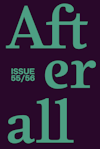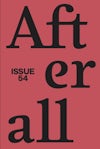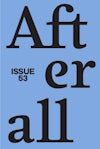
Issue 26
Spring 2011
Issue 26 looks at questions of pedagogy, such as gallery education, Godard’s didacticism, Lina Bo Bardi’s exhibition displays, and through the artists Catherine Sullivan, Isidoro Valcárcel Medina and Group Material. Accompanying texts look at Hans Eijkelboom, theorisations of the event and the current Moscow art scene.
Editors: Pablo Lafuente, Nuria Enguita Mayo, Dieter Roelstraete, Melissa Gronlund, Stephanie Smith.
Founding editors: Charles Esche, Mark Lewis.
Table of contents
Foreword
Contextual Essays
- Alliances for Unlearning: On Gallery Education and Institutions of Critique – Carmen Mörsch
- Art after Primitive Accumulation: Or, on the Putin-Medvedev Cultural Politics – Keti Chukhrov
Artists
Group Material
- Citizen Artists: Group Material – Alison Green
- Counter-Time: Group Material’s Chronicle of US Intervention in Central and South America – Claire Grace
Isidoro Valcárcel Medina
- The Everyday Fact as Peripety – José Díaz Cuyás
- Isidoro Valcárcel Medina’s Constellations – Esteban Pujals Gesalí
Catherine Sullivan
- Fixed Explosive: Catherine Sullivan’s Choreography of Stasis – Catherine Sullivan & Catherine Wood
- Virtuosity and the Survival of the Subject: On Catherine Sullivan – Thom Donovan & Catherine Sullivan
- Abstract Honduras – Farhad Sharmini & Catherine Sullivan
- Excerpts – The Last Days of British Honduras – Farhad Sharmini & Catherine Sullivan
Events, Works, Exhibitions
- The Mass Ornament — Revisited: Hans Eijkelboom’s Photo Notes – Dieter Roelstraete
- ‘This Exhibition Is an Accusation’: The Grammar of Display According to Lina Bo Bardi – Roger M. Buergel
- Pretexts: The Evidence of the Event – Andrew Stefan Weiner
- Late, Latest, Last: Afterthoughts and Footnotes on Godard’s Film Socialisme – Herman Asselberghs
Foreword
As I write from Chicago in December 2010, many of my fellow North Americans are busy debating the recent censorship of David Wojnarowicz’s video A Fire in My Belly (1986-87). A few weeks ago, a religious group and conservative politicians roiled the waters by claiming that a few brief seconds of Wojnarowicz’s dark montage – depicting ants crawling across a crucifix – constitute anti-Christian hate speech. The work was pulled from the National Portrait Gallery’s exhibition ‘Hide /Seek’, a comprehensive and well-received exploration of queer portraiture. This has in turn generated intense debate about an interlocked set of topics, including the social roles of art, artists and cultural institutions; the health of US constitutional protections on free speech and separation of church and state; and the degree to which queer identity has been embraced as a fact of North American experience. And it has prompted art spaces and museums across the country to quickly organise screenings and discussions based on the belief that this work of art deserves to be experienced in full and discussed in depth, rather than sound-bit into a tool for ideological polemics.
Now, this debate may remain a localised one that won’t deeply touch the consciousness of those Afterall readers not living in the United States. Even for readers currently enmeshed in the conversation, it seems likely that this set of events will have faded from collective consciousness by the time this issue of the journal is printed – as distant a memory as the snow that now falls outside my window. But the urgency generated around these questions seems useful to hold in mind as a potential frame for this issue of Afterall, resonating with several of the specific essays that follow, while also offering a broader reminder of Afterall’s aims as a journal.
Afterall is never organised around one specific topic; rather, each issue of the journal offers a compendium of essays that examine carefully selected clusters of artists, exhibitions and ideas that seem especially relevant at the time of discussion. These essays are (almost always) grounded by a primary consideration of the works of art themselves and strive (without fail) to situate art within the world, history and social contexts. And they (often) foster text-to-text interplay, with broad themes recurring and amplifying across one issue of the journal.
Several of the essays in this issue of Afterall address the range of both repressive and emancipatory possibilities that might be articulated within pedagogically oriented formulations of artistic and institutional practice. This is particularly true of Carmen Mörsch’s interrogation of the challenges and potential at stake in crafting a critically engaged role for museum/gallery education and Roger M. Buergel’s reassessment of Lina Bo Bardi’s radically democratic approach to museum and exhibition design, while Andrew Stefan Weiner explores political rhetoric in his meditation on recent performance and video works that problematise considerations of ‘evidence and event’. Herman Asselberghs considers Jean-Luc Godard’s changing relationship to didacticism, as illustrated by his new work, Film Socialisme (2010).
Purchase
The publication is available for purchase. If you would like specific articles only, it is also available individually and to be downloaded as PDFs.
Purchase full publication
Buy via University of Chicago Press
Buy via Central Books
Purchase individual articles
Buy via University of Chicago Press




